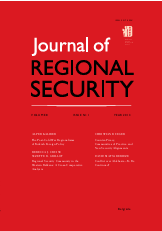The Post-Cold War Regionalisms of Turkish Foreign Policy
The Post-Cold War Regionalisms of Turkish Foreign Policy
Author(s): Alper KaliberSubject(s): Politics / Political Sciences
Published by: BCBP Beogradski centar za bezbednosnu politiku
Keywords: Turkey; Turkish foreign policy; regional security; regionalism; post-Cold War security
Summary/Abstract: This study argues that the post-Cold War changes in Turkish foreign and security policy (FSP) can best be understood as the regionalization of strategic and security outlook in Turkey. Here regionalization refers to two interrelated processes: first, the process whereby security interest definitions and threat perceptions in Turkey have gained an increasingly regional character, and second the process whereby Turkey has increasingly defined itself as an activist regional power. Yet, the current study takes issue with the widespread assumption that regionalist activism of Turkish FSP can only be appropriated to the recent Justice and Development Party governments. Rather, it argues that the regionalist activism observed in the 2000s should be conceived as the second regionalist turn in Turkish FSP. The first wave of regionalization began soon after the end of the Cold War and developed in parallel to the rise of the ‘region’ as a new unit of security in global politics. This study compares and contrasts these two regionalist eras with a view to exploring the post-Cold War regionalization of FSP in Turkey.
Journal: Journal of Regional Security
- Issue Year: VIII/2013
- Issue No: 1
- Page Range: 25-48
- Page Count: 24
- Language: English

